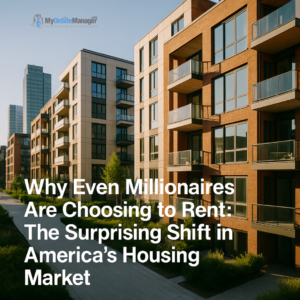For decades, homeownership was seen as the ultimate symbol of success—the cornerstone of the American Dream. But this narrative is shifting. Today, renting isn’t just a stopgap for young adults; it’s becoming a long-term lifestyle choice for millions, including affluent millennials, wealthy retirees, and even millionaires.
According to Business Insider, 45.6 million households in the U.S. were renting in 2023, up from 39.7 million in 2010. This dramatic rise reflects not just economic barriers, but also changing preferences around flexibility, convenience, and financial freedom.
The Cost Barrier: Why Buying Feels Out of Reach
The housing market has been on a wild ride in the past few years. Surging home prices, high mortgage rates, and hidden costs have made ownership less appealing—even for people who can afford it.
-
Homeownership costs are skyrocketing. Beyond a mortgage, homeowners face property taxes, insurance, HOA fees, and maintenance costs that can add hundreds—or even thousands—of dollars per month.
-
Renting offers financial predictability. With a fixed monthly payment and no surprise repair bills, many renters find they can save more and invest elsewhere.
In fact, research shows that in many metro areas, homeowners now spend more than $1,000 extra per month on housing compared to renters. For those with high incomes, renting has become a financially savvy decision rather than a sign of financial instability.
Millionaire Renters: A Growing Trend
One of the most surprising developments in the rental market is the rise of millionaire renters. Data from RentCafe reveals a stunning surge in high-income households opting to rent:
-
Houston is leading the charge. The city saw the number of millionaire households renting jump from just 7 in 2019 to 179 in 2023—a 25-fold increase.
-
Nationwide, millionaire renter households have tripled, reaching nearly 13,700 in 2023.
-
Millennials dominate this category, representing almost half of these high-income renters.
Why are wealthy individuals choosing to rent instead of buying sprawling estates? The answer lies in flexibility, convenience, and financial strategy. Renting allows them to live in high-demand locations, avoid long-term commitments, and invest their capital in assets with higher returns than real estate.
The Millennial Mindset Shift
Millennials, once expected to be the generation that would revive homeownership, are now reshaping housing trends. Many millennials—wealthy or not—are opting to rent for reasons such as:
-
Lifestyle flexibility. Renting makes it easier to move for career opportunities or personal preferences.
-
Freedom from maintenance. From broken water heaters to roof repairs, renting eliminates the stress and cost of surprise expenses.
-
Investment priorities. Rather than tying up their wealth in a single property, many prefer investing in stocks, startups, or digital assets.
A Real-Life Example: The Werners’ Story
The Werners, a millennial couple in Houston, perfectly illustrate this shift. In 2022, they bought a three-bedroom home for roughly $390,000, locking in a 3.75% mortgage with monthly payments of about $2,600. It seemed like a great deal—until reality set in.
Within months, they were dealing with gas leaks, air conditioning issues, plumbing repairs, and pool maintenance costs that ate into their savings. Frustrated by the endless expenses, they decided to sell the home for $429,000 and switch to renting a townhouse for $2,800 per month.
For them, renting not only reduced financial stress but also gave them back their time and peace of mind. “We realized the American Dream doesn’t have to mean owning a house,” they shared.
Why Older Adults Are Renting, Too
It’s not just millennials driving this trend—baby boomers and retirees are renting in record numbers.
-
Some retirees are downsizing from large homes to low-maintenance apartments or luxury rentals.
-
Others are tapping into their home equity by selling, then renting to maintain liquidity for travel or healthcare expenses.
-
High property taxes and the cost of upkeep are making ownership less attractive in retirement years.
For many boomers, renting is less about necessity and more about simplifying their lives.
Financial Experts Are Reconsidering the “Own vs. Rent” Debate
Traditional financial wisdom suggested that owning a home is the ultimate way to build wealth. But experts now argue that the math doesn’t always add up—especially in today’s economy.
When factoring in property taxes, maintenance, and interest costs, the returns on homeownership are often far lower than people realize. In contrast, renters can invest the money they would have spent on home repairs or upgrades into higher-yield investments.
What This Means for the Housing Market
This shift toward renting is reshaping the real estate landscape:
-
Luxury rentals are booming as developers cater to wealthy renters who want amenities like pools, gyms, and concierge services.
-
Homeownership rates may stagnate as younger generations delay buying homes—or skip it altogether.
-
Cities with high job growth (like Houston and Austin) are seeing increased demand for high-end rental properties.
Final Thoughts: A New American Dream?
The rise of millionaire and older renters suggests that the American Dream is evolving. For many, financial freedom, mobility, and lifestyle flexibility are now more valuable than owning a piece of property.
Whether you’re a millennial investor or a retiree looking to downsize, renting can be a strategic choice—one that aligns with modern priorities and financial realities.
Source
-
Business Insider: “Not quite the American dream: Renting is becoming a better deal, even if you’re wealthy or a retiree” (May 21, 2025)
Read the full article here

